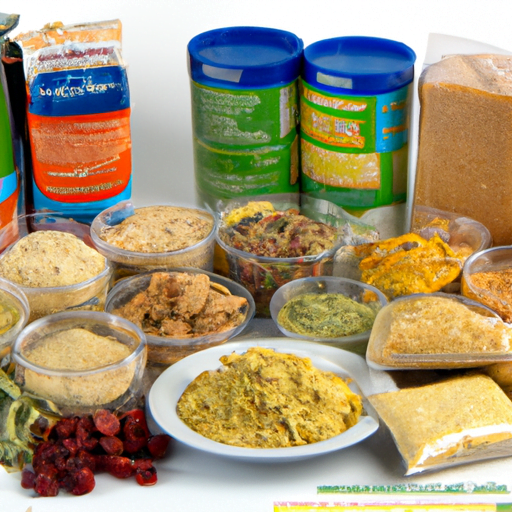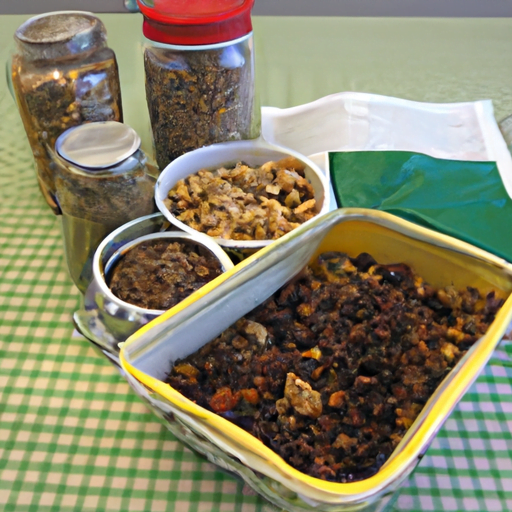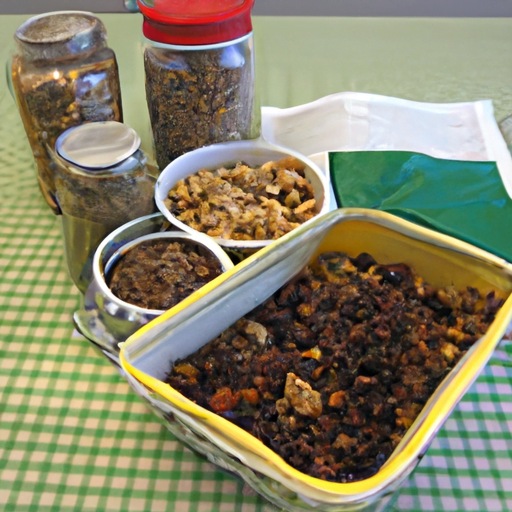So, you’ve decided to venture into off-grid living. That’s pretty cool! But now you’re probably thinking about the practicalities of it all. One thing that might be on your mind is what kind of food you should be storing. After all, living off-grid means being self-sufficient and not having easy access to the grocery store. Don’t worry, though, because I’ve got you covered. In this article, we’ll be diving into the top 10 bulk foods that are perfect for off-grid living.
When it comes to off-grid living, you need to think long-term sustainability. That means having food that is shelf-stable and can last a while without spoiling. Pasta is an excellent option, as it has a long shelf life and is versatile for cooking different meals. Rice is another great choice, as it is a staple in many cuisines and can be stored for a long time. And let’s not forget about beans – they are packed with protein and can be used in a variety of dishes.
But it’s not just about the basics. You’ll also want some variety in your diet, even when living off the grid. That’s where canned fruits and vegetables come in handy. They have a long shelf life and can add some much-needed freshness to your meals. And if you’re a fan of baking, having a good supply of flour, sugar, and baking essentials is a must. These are just a few examples of the top 10 bulk foods that are perfect for off-grid living. Interested in learning more? Keep reading our article for all the juicy details!

Introduction to Off-Grid Living
Living off-grid has become increasingly popular in recent years as more people look for ways to live a more sustainable and self-sufficient lifestyle. But what exactly does it mean to live off-grid?
Defining Off-Grid Living
Living off-grid refers to the lifestyle of being self-sufficient and not relying on public utilities such as water, electricity, and gas. It involves generating your own power through renewable energy sources like solar panels or wind turbines, collecting rainwater for household use, and growing your own food through gardening or farming.
Benefits of Off-Grid Living
There are several benefits to living off-grid. Firstly, it allows you to reduce your reliance on fossil fuels and minimize your carbon footprint. By generating your own power, you can significantly reduce or even eliminate your electricity bills, making it a more cost-effective option in the long run.
Living off-grid also promotes self-sufficiency and resilience. You become less dependent on external resources and are better equipped to handle power outages or other disruptions to the grid. Additionally, living off-grid often means living closer to nature, which can have positive effects on your mental and physical well-being.
Challenges of Off-Grid Living
While there are many advantages to living off-grid, it does come with its fair share of challenges. One of the main challenges is the initial cost of setting up an off-grid system. The cost of solar panels, batteries, and other equipment can be quite expensive, although the long-term savings on utility bills can offset these costs.
Another challenge is the need for careful management of resources. Living off-grid means being mindful of your energy consumption, water usage, and waste generation. It requires a more conscious and sustainable approach to daily life.
Importance of Bulk Foods in Off-Grid Living
When it comes to off-grid living, one of the most important considerations is food storage. Being self-sufficient in terms of food is crucial, as it ensures that you have a constant and reliable food supply, regardless of any external factors such as food shortages or disruptions in supply chains. This is where bulk foods play a significant role.
Reasons to Store Bulk Foods
Storing bulk foods offers several advantages in off-grid living. Firstly, it allows you to buy food in larger quantities, which is often more cost-effective than buying smaller packages. Bulk foods also have a longer shelf life, making them ideal for long-term storage. By storing bulk foods, you can ensure that you always have access to food, even during emergencies or times when it is difficult to reach the grocery store.
Tips for Proper Food Storage
Proper food storage is crucial in maintaining the quality and freshness of bulk foods. Here are some tips to consider:
- Use airtight containers or food-grade buckets to store your bulk foods. This helps to prevent moisture, pests, and odors from affecting the food.
- Keep your stored food in a cool, dry place away from direct sunlight. Temperature and humidity fluctuations can cause food to spoil more quickly.
- Rotate your stock regularly. Use the “first in, first out” principle to ensure that older food gets used first.
- Label your containers with the date of purchase and the contents to easily keep track of what you have and when it needs to be used.
Advantages of Bulk Food Storage
Bulk food storage offers several advantages in off-grid living. Firstly, it provides a sense of security knowing that you have a sufficient food supply that can sustain you and your family for an extended period. It also allows you to have a more diverse diet by having a variety of food options readily available. Having bulk food storage can also save you money in the long run, as buying in bulk often translates to lower costs per serving.

Factors to Consider when Choosing Bulk Foods for Off-Grid Living
When selecting bulk foods for off-grid living, it’s important to consider certain factors. These factors can ensure that the food you choose meets your nutritional needs and is practical for use in a self-sufficient lifestyle.
Long Shelf Life
One of the primary considerations is the shelf life of the food. Look for foods that have a long shelf life to ensure that they remain safe and consumable for an extended period. This is particularly important in off-grid living, where access to fresh food may be limited.
Nutritional Value
Another important factor is the nutritional value of the food. Choose foods that are high in essential nutrients such as vitamins, minerals, and protein. This will help ensure that you are getting the necessary nutrients to maintain a healthy diet.
Versatility of Use
Consider the versatility of the food. Look for foods that can be used in various recipes and dishes. This will provide you with more meal options and prevent food boredom.
Easy Preparation
When living off-grid, simplicity is often key. Choose foods that require minimal preparation and cooking time. This will help conserve energy and make meal preparation more efficient.
Affordability
Lastly, consider the affordability of the food. While it may be tempting to opt for expensive gourmet or specialty items, it’s important to choose foods that are within your budget. Look for cost-effective options that still meet your nutritional needs.
Top 10 Bulk Foods for Off-Grid Living
When it comes to selecting bulk foods for off-grid living, there are several options that tick all the boxes in terms of shelf life, nutritional value, versatility, ease of preparation, and affordability. Here are the top 10 bulk foods for off-grid living:
Rice
Rice is a staple food that has a long shelf life and is incredibly versatile. It is high in calories and carbohydrates, making it an excellent source of energy. Rice is also easy to cook and store, making it an ideal choice for off-grid living.
Beans
Beans are an excellent source of protein and fiber. They have a long shelf life and can be used in a variety of recipes such as soups, stews, and tacos. With a wide variety of bean types available, you can easily find options that suit your taste preferences.
Oats
Oats are high in fiber and can provide a good source of energy. They can be used in a variety of ways, including breakfast cereals, oatmeal cookies, or as a topping for yogurt or smoothies. Oats also have a long shelf life, making them an ideal choice for off-grid living.
Lentils
Lentils are packed with protein and fiber, making them a nutritious choice for off-grid living. They are also easy to cook, requiring no pre-soaking like other legumes. With different types of lentils available, you can add variety to your meals while still getting essential nutrients.
Dried Fruits
Dried fruits are a great source of essential vitamins and minerals. They have a long shelf life and can be enjoyed as a snack or used in baking and cooking. Dried fruits also add natural sweetness to dishes without the need for added sugars.
Nuts and Seeds
Nuts and seeds are nutritional powerhouses, rich in healthy fats, protein, and fiber. They have a long shelf life and can be used as a snack or added to various dishes for added texture and flavor.
Whole Grains
Whole grains such as quinoa, barley, and wheat berries are packed with nutrients and can be used in a variety of recipes. They have a long shelf life and provide a good source of fiber and essential minerals.
Pasta
Pasta is a versatile food that can be stored in bulk. It is easy to cook and can be used as a base for various pasta dishes. Opt for whole wheat pasta for added nutritional value.
Powdered Milk
Powdered milk is a convenient option for off-grid living, as it has a long shelf life and can be used in cooking, baking, and as a dairy alternative. It provides a good source of calcium and protein.
Dehydrated Vegetables
Dehydrated vegetables are a practical choice for long-term storage. They have a long shelf life and can be rehydrated for use in soups, stews, and other dishes. They provide essential vitamins and minerals, making them a valuable addition to any off-grid pantry.
Conclusion
When it comes to off-grid living, having a well-stocked pantry of bulk foods is essential. By choosing foods with a long shelf life, high nutritional value, versatility, and ease of preparation, you can ensure that you have a reliable and sustainable food supply. The top 10 bulk foods listed in this article are a great starting point for anyone looking to embark on an off-grid lifestyle.




